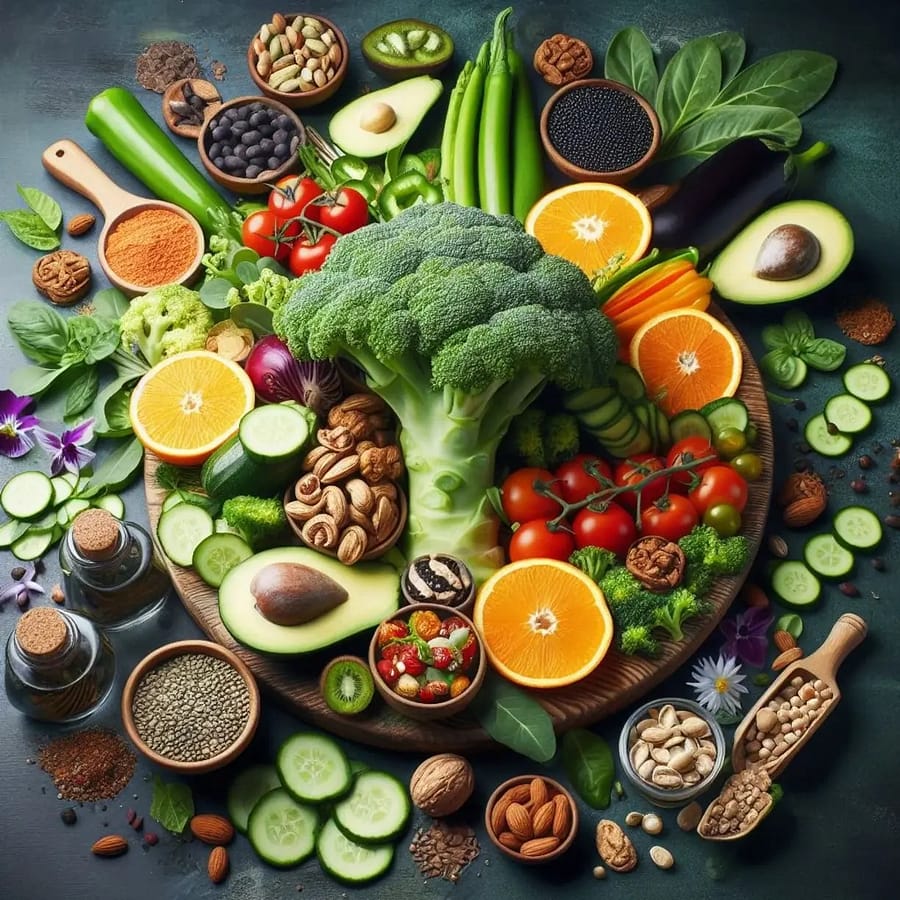Plant-based diets are no longer a fringe trend but a powerful movement gaining momentum worldwide. Driven by diverse motivations, from health and wellness to environmental concerns, people are discovering the transformative potential of centering their plates around plants. But what exactly are plant-based diets, and what advantages can they offer you? Let’s delve into the world of plant-powered living and unveil the benefits waiting to be unlocked.
Plant-Based Diets
In recent years, plant-based diets have been gaining momentum, attracting people with diverse motivations. From health enthusiasts to environmental advocates, many are discovering the potential benefits of incorporating more plants into their plates. But what exactly are plant-based diets, and what advantages can they offer?

Understanding the Spectrum: Plant-Based Diets
Plant-based diets encompass a range of approaches, each varying in the degree of animal product restriction. Here’s a quick breakdown:
- Vegetarian: A vegetarian diet typically avoids meat, poultry, and fish, while allowing for the consumption of dairy and eggs.
- Vegan: Eliminates all animal products, including dairy, eggs, and honey.
- Flexitarian: Primarily plant-based with occasional inclusion of animal products.
Benefits Beyond the Plate:
While individual choices may vary, research suggests several potential benefits associated with plant-based diets:
1. Healthier Weight Management: Studies have shown that plant-based diets can promote weight loss and maintenance due to their typically lower calorie density and higher fiber content.
2. Reduced Risk of Chronic Diseases: Plant-based diets are often rich in fruits, vegetables, legumes, and whole grains, which are linked to a lower risk of heart disease, type 2 diabetes, and certain cancers.
3. Improved Gut Health: The high fiber content in plant-based diets nourishes gut bacteria, leading to better digestion, immune function, and potentially reduced inflammation.
4. Boosted Energy Levels: The complex carbohydrates and diverse nutrients in plant-based foods provide sustained energy, unlike the sugar crashes often associated with processed foods.
5. Environmental Impact: Animal agriculture contributes significantly to greenhouse gas emissions and resource depletion. Choosing plant-based options can minimize your environmental footprint.

Getting Started:
Interested in exploring a plant-based lifestyle? Here are some tips:
- Start small: Gradually incorporate more fruits, vegetables, and whole grains into your diet.
- Explore delicious recipes: Many resources offer tasty and satisfying plant-based meals.
- Find support: Connect with online communities or join local groups for encouragement and guidance.
- Consult a healthcare professional: If you have any health concerns, discuss your dietary plans with a doctor or registered dietitian.
Keep in mind that transitioning to a plant-based diet is a process, not a final destination. Experiment, find what works for you, and enjoy the journey towards a healthier, more sustainable lifestyle!
Important Note: While plant-based diets offer numerous benefits, it’s crucial to ensure you meet all your nutritional needs. Consult a healthcare professional or registered dietitian for personalized guidance, especially if you have any underlying health conditions.
This blog post provides a starting point for exploring the world of plant-based diets. With its easy-to-understand language and evidence-based approach, it aims to inform and inspire readers to consider the potential advantages of incorporating more plants into their lives.
FAQs
Q: Are plant-based diets healthy?
A: Yes, research suggests they offer numerous health benefits, including weight management, reduced risk of chronic diseases, improved gut health, and boosted energy levels.
Q: What are the different types of plant-based diets?
A: Vegetarian (excludes meat, poultry, fish), vegan (eliminates all animal products), flexitarian (mostly plant-based with occasional animal products).
Q: How can I start a plant-based diet?
A: Start small by incorporating more fruits, vegetables, and whole grains. Explore delicious recipes, find supportive communities, and consult a healthcare professional for personalized guidance.
Quotes:
The earth provides enough to satisfy every man’s need, but not every man’s greed.
– Mahatma Gandhi
Let food be thy medicine and medicine be thy food.
– Hippocrates
Plants are living beings with feelings and souls, just like animals.
– G.M. Allen

Conclusion:
Embarking on a plant-based journey can be transformative. While individual needs and preferences vary, the potential benefits are undeniable. From promoting long-term health and well-being to minimizing your environmental impact, a plant-rich lifestyle offers a fulfilling and empowering path. Remember, this is not a restrictive diet, but an exploration of delicious, nutrient-dense foods that nurture your body and the planet. Start small, experiment, find your balance, and enjoy the journey towards a vibrant, plant-powered you!
More Read:
- Mental Health Awareness and Self-Care Practices: Cultivating Your Oasis in 2024
- Gut Health & Microbiome Solutions: Unlocking Your Inner Ecosystem’s Power in 2024
